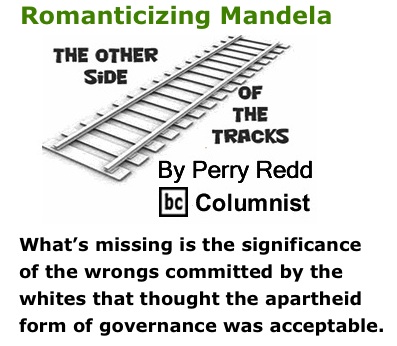

The
watch is on as former South African President Nelson Mandela reaches
his twilight. Mandela is now in critical condition and the end is near.
Mandela’s condition worsened in the past 24 hours. We know what time it
is.
Humanly, we prepare for mourning. It’s not easy admitting the end of a
life so significant to human progress, but it is what it is. What
bothers me, though, is the seemingly endless efforts of many to
romanticize Mandela’s darkest years. When Mandela did what others
wanted to do - and few did - there were millions more standing on the
sidelines waiting to see what shook out.
In 1962, he was arrested, convicted of sabotage and conspiracy to
overthrow the government - the very apartheid government that America
supported - and sentenced to life imprisonment in the Rivonia Trial.
Mandela served 27 years in prison, first on Robben Island. His
conviction, of course, was politically targeted and eventually, worked
against the white-run South African government. Now, I see
documentaries, plays and dramatizations of Mandela’s “struggle” against
apartheid. That’s as it should be, yet what’s missing is the
significance of the wrongs committed by the whites that thought the
apartheid form of governance was acceptable.
I attended a play at DC’s Folger Shakespeare
Theater where the on-stage performers read words written by Robben
Island prisoners who were held in captivity alongside Mandela. In The
Robben Island Bible, a play written and directed by Matthew Hahn, the
prisoners’ survival was in part due to their encoding Shakespeare into
their protests against their imprisonment. Compelling to say the
least...yet the play fails to leave the audience appalled at the
inhumanity of colonialism, thus leaving the audience with nothing to
apologize for. I would have listed myself along with the captivated,
except that I couldn’t hear the atrocities of the whites who held him.
Telling the story is necessary, but romanticizing imprisonment is
unacceptable. What I deem appropriate is mentioning in the same breath
the conditions that brought Mandela’s imprisonment to be. It is true
and accurate that Nelson Mandela survived a horrendous injustice - for
27 years, no less. But it is disingenuous to frame his imprisonment in
the context of a welcomed martyrdom. No man embraces bondage.
Mandela was definitely a hero, yet an unwilling one. We must make grand
note of the monstrous colonization by the Dutch descendants that
brought racial domination to reality. Racial segregation in South
Africa began in colonial times under Dutch and British rule. However,
apartheid as an official policy was introduced following the general
election of 1948. I wonder who voted “yes” on that? This concept of
segregation in Mandela’s homeland is not relegated to centuries-old
history!
This new legislation classified inhabitants into four racial groups
(“native”, “white”, “colored“, and “Asian”), and residential areas were
segregated, sometimes by means of forced removals. Non-white political
representation was completely abolished in 1970, and starting in that
year, Black people were deprived of their citizenship, legally becoming
citizens of one of ten tribally based self-governing homelands called
bantustans, four of which became nominally independent states. The
government segregated education, medical care, beaches, and other
public services, and provided Black people with services inferior to
those of white people.
This relatively recent phenomenon - apartheid,
that is - is far too often side-stepped when telling the stories of
“the overcoming Black man.” No, I don’t believe in sharing the hero’s
storyline with the villians’ devilish deeds; there is too much
deference given to justification. Yet, one must not whitewash the facts
of the matter.
I feel compelled to open this eventuality of missing the condition that
gave rise to Mandela’s triumph: white oppression, not only in South
Africa, but in the “civilized” Western world. I can’t let white people
get away with softening their roles in Mandela’s saga. To this day,
Blacks are not healed, nor have they been made whole from the legacy of
apartheid; much the same in the U.S. with its history of Jim Crow
racism. Whites will “de-color” Mandela and make him “every man.” I see
it coming.
Beware of the tendency of racial dominators to lean toward
reconciliation without unclenching the fist of socio-economic
inequality. To make you feel good about Mandela’s triumph is to forget
the racist system that placed him in the position of having to
overcome. Don’t get caught up in the romanticizing of Nelson Mandela.

BlackCommentator.com Columnist, Perry Redd, longtime activist & organizer, is the Executive Director of the workers rights advocacy, Sincere Seven, and author of the soon-to-be-released on-line book, “As A Condition of Your Freedom”. He is also the host of the internet-based talk radio show, Socially Speaking in Washington, DC. Click here to contact Mr. Redd.





